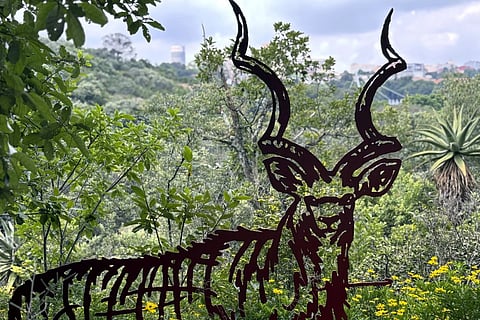A South African artist uses vibrant sculptures to make parks more inviting in a city often associated with danger
Johannesburg’s urban landscape is undergoing a quiet transformation, led by artist James Delaney. Over the past decade, Delaney has created more than 100 vibrant metal sculptures, turning once-neglected parks into inviting communal spaces. His work, which includes steel kudu antelopes, pink giraffes, and owls peering from jacaranda trees, aims to make public spaces not just visually appealing but also safer and more welcoming.
In a city often associated with crime, the presence of people is key to safety. “Artworks can bring a sense of life to public spaces,” says Delaney, who has exhibited in London, Paris and New York. “And public spaces need lots of people to be functional and to be safe.”
Authorities in Johannesburg have encouraged public art initiatives to improve safety and environmental conditions. With a population of around six million, the city’s downtown area is often perceived as dangerous. However, Delaney’s work strives to shift this narrative by creating spaces that people feel drawn to.
“One can create a public space with grass and trees, and it’s nice. But to truly attract people and capture their imagination, one has to do more,” he explains.
A park on the edge of contrast
Delaney’s most well-known work can be found at The Wilds, a park nestled between Johannesburg’s affluent and less privileged areas. On one side, tree-lined Killarney and Houghton—where Nelson Mandela lived during his presidency—contrast sharply with the bustling, often rundown neighbourhoods of Berea and Yeoville.
When Delaney first discovered The Wilds in 2014 while walking his dog Pablo, it was an overgrown and abandoned space. Since then, he has worked tirelessly to restore it—repainting benches, pruning plants, and gathering volunteers and donors to bring life back into the area. Today, thanks to his efforts, it has become a meeting point for families, yoga enthusiasts, and schoolchildren.
Lydia Ndhlovu, a mother of two, enjoys visiting with her children but remains cautious. “I don’t feel safe being here alone with them,” she admits. “But when I see elderly people enjoying the park, I know it’s safe for us too.”
Despite Johannesburg’s reputation, some residents argue that not all parks are unsafe. Jenny Moodley, a spokesperson for Johannesburg City Parks, points out that the city maintains over 2,000 parks, as well as nature reserves and bird sanctuaries.
“Many of these open spaces are safe,” she says. “Children play unsupervised, and elements such as art reinforce that these are vibrant spaces where families and friends can come together.”
Art as a gateway to community engagement
Delaney recently expanded his efforts with a second urban park regeneration project in Killarney. Here, a three-metre-high bright orange gate featuring a metal raptor perched on an aloe plant invites passers-by to step inside and explore.
For longtime Killarney resident Anna Starcke, the sculptures represent something deeper than aesthetics. “It’s very important that people feel the parks are theirs,” she says.
Having lived through apartheid, Starcke believes that public spaces can play a role in fostering inclusivity. “If we can get a majority of people to care about their parks, their art, and being together—sitting on the same bench—then we have won.”
Through his work, Delaney continues to reshape Johannesburg’s public spaces, proving that art can be a catalyst for both safety and community.
4o

